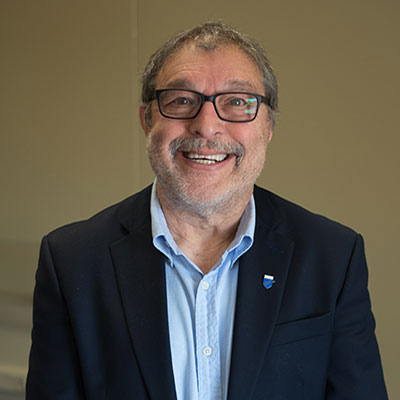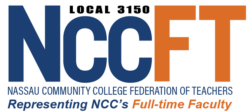 Welcome to the Fall 2018 semester. I want to extend our appreciation to the non-classroom faculty who ensure a smooth start to classes and provide, throughout the year, the continued support services essential for student success. I hope everyone had a wonderful summer and that you are energized to meet the challenges this new academic year will bring.
Welcome to the Fall 2018 semester. I want to extend our appreciation to the non-classroom faculty who ensure a smooth start to classes and provide, throughout the year, the continued support services essential for student success. I hope everyone had a wonderful summer and that you are energized to meet the challenges this new academic year will bring.
First among those challenges is the fallout from the Supreme Court’s Janus decision, which made “right to work (for less)” the law of the land. This is an historic change for public sector unions. We know it is only the opening salvo in what is certain to be a well-coordinated and concerted attack on organized labor, and so I am very happy to be able to report that 100% of our bargaining unit is now enrolled in the NCCFT. There are still some missing recommitment cards that we need to collect in order to be prepared for the kinds of assaults on our membership status that are already taking place in school districts throughout New York State. However, I am confident that we all recognize the importance of solidarity and will successfully complete this organizational task. While it may not be couched in these terms, the Janus case, along with its fallout, is a direct attack on our collective bargaining agreement and the rights, privileges, and working conditions that are enshrined there. Our working conditions, we should never forget, are our students learning conditions, and so, when we protect our CBA, we also protect the quality of education we are able to provide.
The Institutional Planning Committee and the Middle States Reporting Committee, each of which include representation from all constituencies on campus, worked throughout the summer on the Middle States Monitoring Report, and they are prepared to submit the final report this month. Please be sure to read this important document, which puts our institutional progress into context and outlines the challenges and opportunities that lie ahead of us.
As we are all aware, the enrollment/retention of our students continues to decline. This declining enrollment contributes to an ever-worsening economic burden upon the institution. We have been lobbying our elected leaders in the county and state for additional funding, and we have been successful in obtaining capital funds. However, there does not seem to be a political appetite for substantial increases in operations. Therefore, in addition to continued lobbying, there are several initiatives, outlined in Dr. Keen’s Annual Report, that the NCCFT, AFA, CSEA, students and the college administration are undertaking to evaluate and reverse this downward spiral. Among them is a joint colloquium that will be presented by the NCCFT, Academic Senate, AFA, CSEA and Administration on Friday, October 5 in the CCB Multipurpose Room. The goal of this colloquium will be to examine best practices for student retention and to provide the college community an update on the state of affairs and resources available to everyone in order to increase student success.
The budgetary strain caused by this downward spiral in retention led the NCCFT and Administration to sign an MOA providing for an Early Retirement Incentive. We want to extend our congratulations and best wishes to the following NCCFT members who have retired as of August 31, 2018: Betty Borowsky, Patricia Chiodo, Jeffrey Cohen, Joseph Coppolino, Fannie Davis, Carmine DeSanto, Matthew Dunlop, Jr., Barbara Edward, Wendy Eisner, Marquita James, Charles Kean, Lyle Hallowell, Deborah Kimbrough-Lowe, Barbara Lucas, Naomi Malmud, Eileen Morrison-Darren, Mary O’Loughlin, Maureen Palmieri, Judith Rosado, Nancy Rothbaum, and Delores Smalls. Also, in recognition of the indispensable contributions made to this campus by our non-classroom faculty, Dr. Keen and I have agreed to a proposal, to be submitted to the Board of Trustees, to establish a mechanism whereby deserving non-classroom retirees without academic rank will be eligible to obtain Emeritus status, providing them with the honors that accompany this designation.
One of our primary concerns in negotiating the terms of the early retirement incentive was to protect and maintain for the 2018-2019 academic year all 23 Temporary Lines which were in effect as of Spring 2018. This number excludes those of our colleagues now entering their 5th consecutive semester and whose lines will therefore be automatically converted to probationary. According to the terms we negotiated, the college will convert all remaining NCCFT Temporary Lines into Permanent Lines effective September 1, 2019. The next step is to move on to the conditions for the replacement of our retirees, which are outlined in the MOA. This will be addressed by the Academic Chairs, Deans and Vice Presidents.
The Governance Council—whose members include Dr. Keen, Dr. Collins, VP Maria Conzatti, other members of the cabinet when necessary, and the elected faculty leadership—met throughout this summer. One thing we are still trying to reach an agreement on is the composition of the Administrative Search Committees. It is important the we reach an agreement as soon as possible so that searches can proceed for a number of administrative positions currently filled by acting/interim appointments. Meanwhile, several searches have been successfully conducted and selections have been made for the Director of Educational Opportunity, Assistant Vice President of Distance Education, Assistant Vice President of Labor Relations, and the Dean of Health Sciences. I want to congratulate them and welcome them to our Community.
In other search-related news, the Presidential Search Committee has been selected and its work is already in the process. In order to ensure that the Board-of-Trustee positions are all filled, at least in part in anticipation of the presidential search, the Governor’s office has appointed John Durso and George Siberon to the Board. I want to welcome them and look forward to working with them. We will be discussing the reality of a new college president in future posts. For now, let’s just consider that this reality is just around the corner.
Another important outgrowth of this summer’s Governance Council meetings is an agreement to reach out to the Academic Senate for input to present to the Board of Trustees a modified Media Policy 3100. Due to vague language in the resolution as originally adopted by the Board, we (by which I mean the faculty leadership on the Governance Council)—along with some others of our colleagues—raised concerns about whether that language misrepresented the policy’s spirit and intent. Revisions to Media Policy 3100 that are scheduled to be presented to the Board of Trustees at its first meeting on September 4th demonstrate that Board policies, like the Senate bylaws, are living documents that can be revised where appropriate and/or necessary. (The policy as originally passed is here; the revised version is here.)
Unfortunately, an outside group, the Foundation for Individual Rights in Education (FIRE) inserted itself into campus business concerning this policy and Newsday published an article in which the reporter ignored entirely the comments she solicited from the elected faculty leadership. I want to remind everyone that we have, we are, an influential union; we have a vibrant academic senate and a committed group of academic chairs, all of whom have been duly elected to represent us. We are in constant communication with each other, and the solidarity that I mentioned earlier is strongest when we, as a collective, respect and work within this governance structure. It is foolish and dangerous for individuals who do not like the pace or direction of governance to attempt to circumvent its process in pursuit of their own agenda(s).
This fall semester we begin our “Professor on Wheels” community service initiative with the Town of Hempstead. Professors from Nassau Community College who volunteer to do so will offer a series of lectures at senior centers in Nassau County. The program has been designed so that seniors who participate will receive a special certificate degree from Nassau Community College, to be awarded at a “graduation” ceremony. Our AVP of Government Affairs, Kate Murray, has been instrumental in coordinating with the Town of Hempstead and their Office of Senior Affairs (East Meadow/Levittown Center) to identify the center(s) where this program will take place. The response from the NCCFT faculty has been impressive. If you are interested in volunteering to give one (1) lecture or demonstration for either the fall and/or spring semester about 1-1.5 hours long to a group of senior citizens, please contact the NCCFT office.
I look forward to an exciting, positive semester and have every confidence that we will be successful in all our endeavors through commitment, collaboration, and inclusion. See you around campus.

4 Responses
Congrats on 100% membership and on Professor Emeritus for Non Classromm faculty
Our union (along with the AFA) is our best representation of our unity. In the appalling environment of our current government, and in the face of direct assaults against academia, it is beyond crucial for us to speak out, debate, and discuss–always with respect and intelligence–as we meet the challenges presented to the NCC faculty.
Please stop calling everything a “living document.” This term has a very specific historic and legal meaning. All laws, contracts and legal agreements can, under certain circumstances be changed. How difficult it is to do so depends on the specific document. Regarding, for example, the Senate bylaws, the terms the NCCFT agreed to make it near impossible to change unless the BOT unilaterally chooses to change these. It is not, therefore, what lawyers would refer to as a “living document.” Unless we all must live in Trumpworld where reality and truth is defined by he who holds power, please stop misusing this term.
For those who are unfamiliar with the Foundation for Individual Rights in Education, which is referenced above, here is the letter it wrote to then NCC President Donald Astrab in 2011 regarding free expression and assembly on campus.
https://www.thefire.org/fire-letter-to-nassau-community-college-president-donald-p-astrab-august-16-2011/